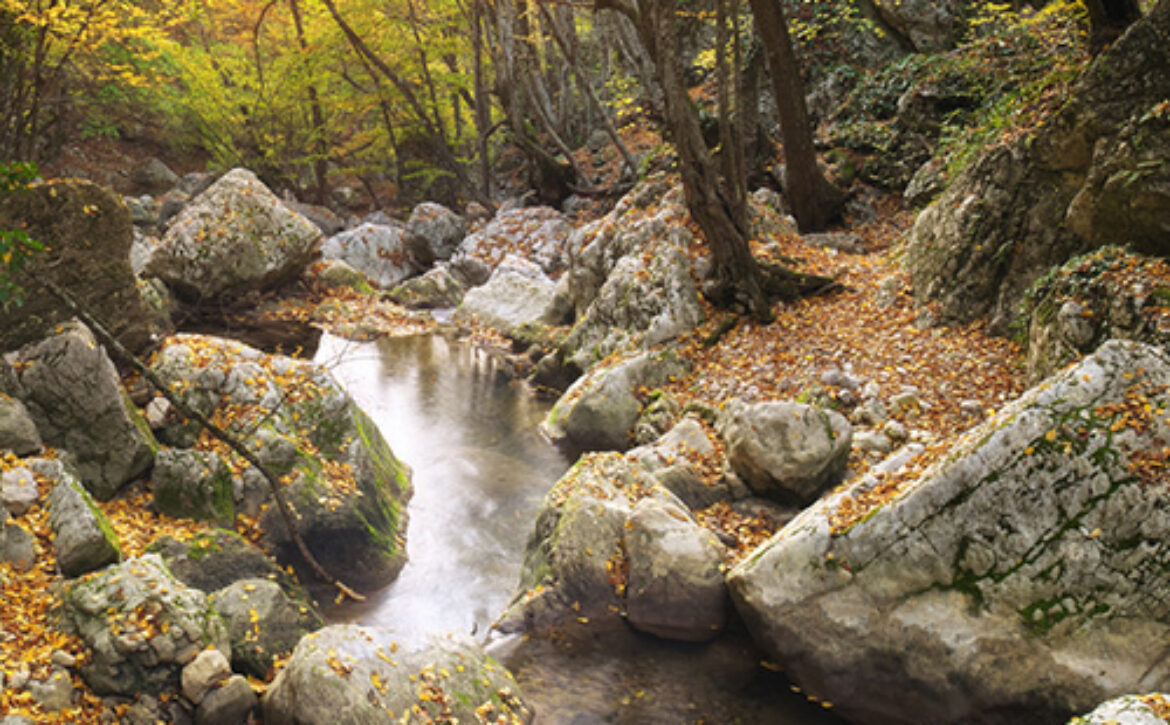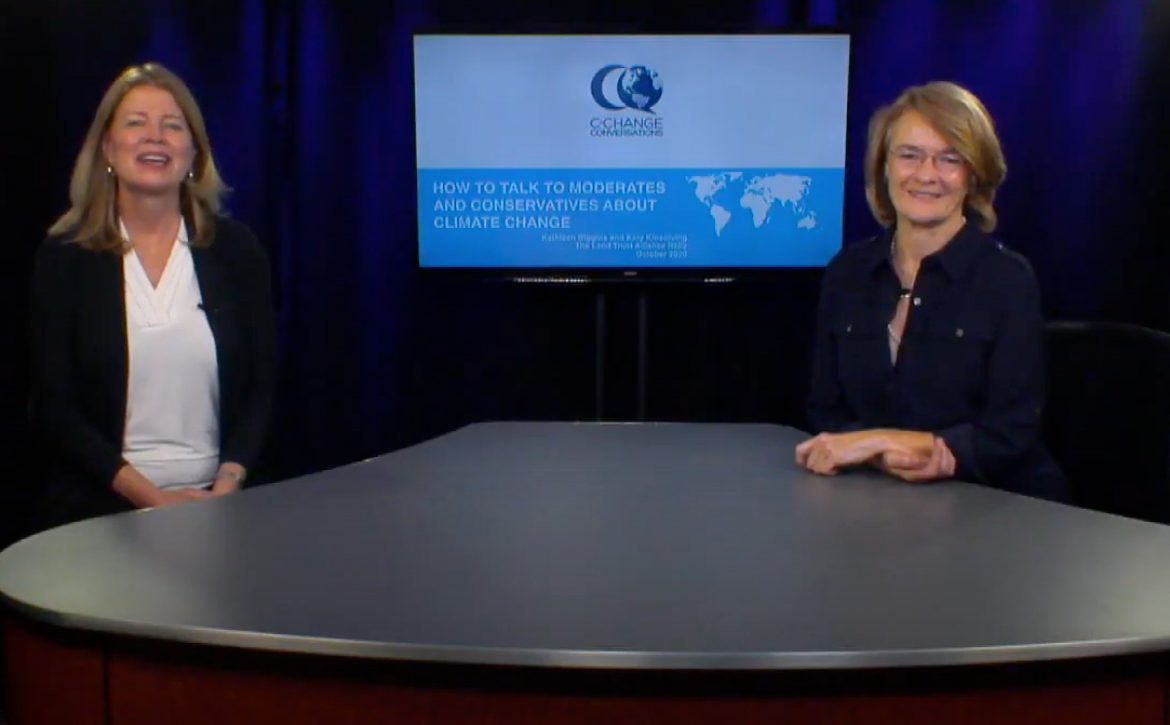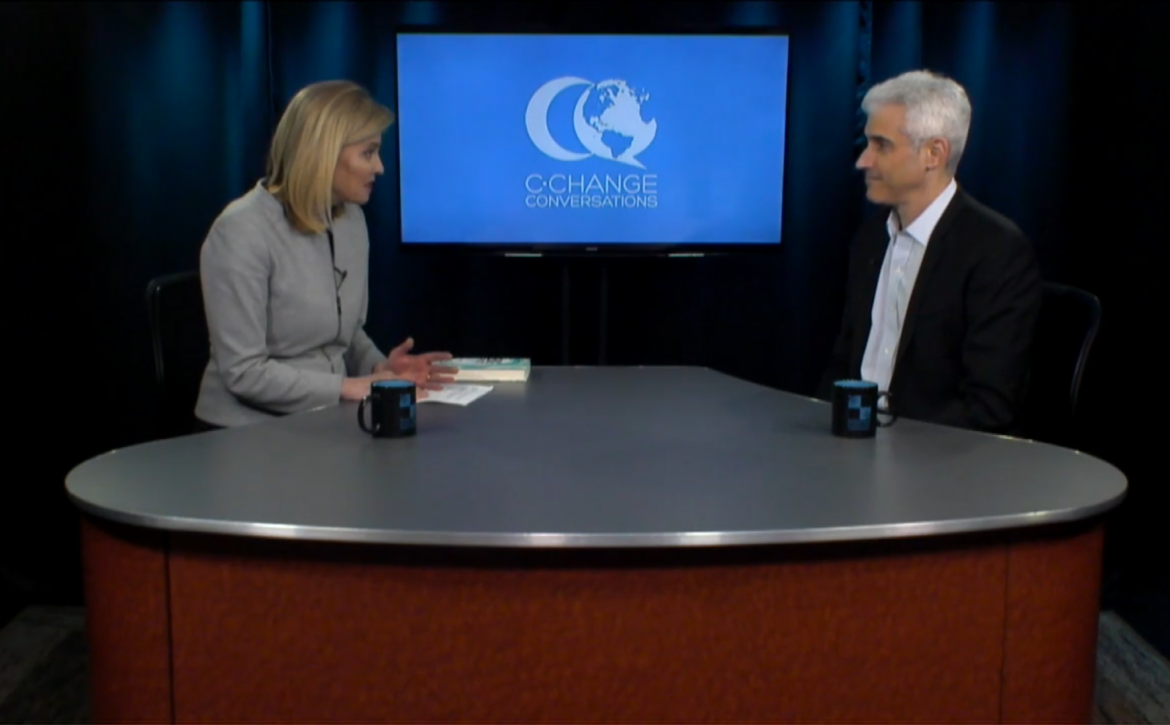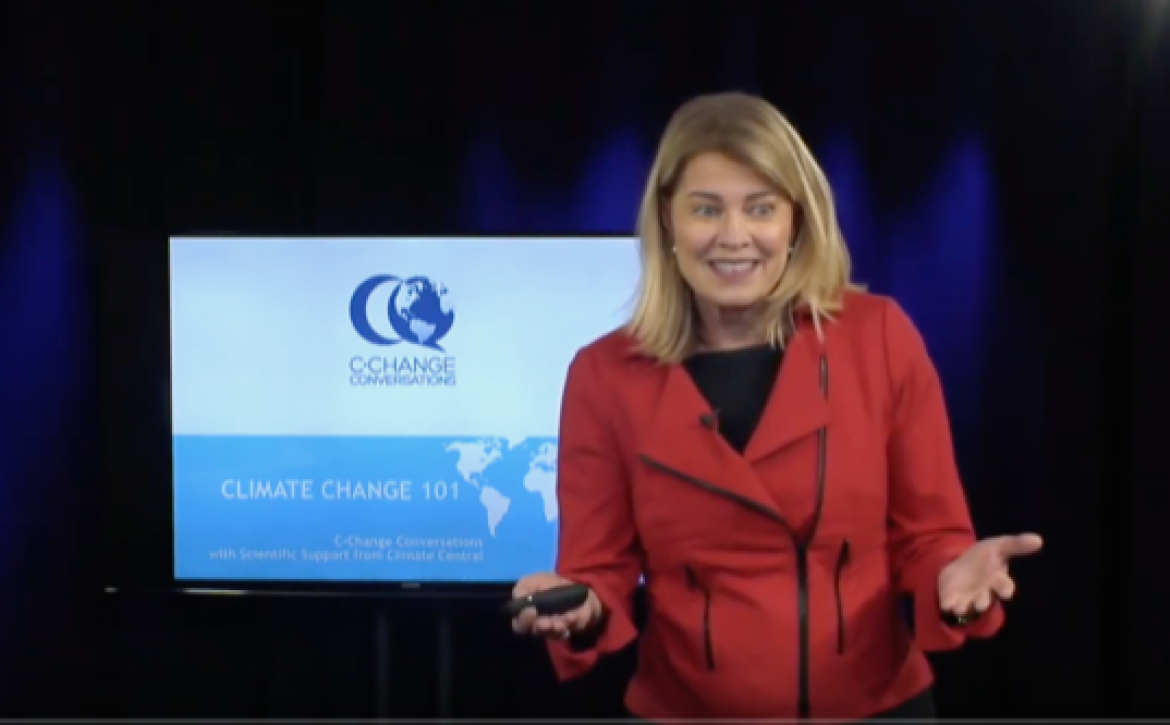July 2022 Quarterly Newsletter
We are so excited about new developments at C-Change that are enabling us to expand our reach and impact, such as…
We are so excited about new developments at C-Change that are enabling us to expand our reach and impact, such as…
Nearly 1,000 students, parents, and faculty – C-Change’s largest audience ever – attended a Primer presentation in February.
Dear Friends,
What a way to begin the year! With the surge in COVID-19 cases, it feels a bit like the movie “Groundhog Day,” where time keeps looping back over and over. Just when we were supposed to be ramping up and going “full throttle,” presenting on the road, we are returning to Zoom or rescheduling, hoping for a safer time to come together.
That said, C-Change Conversations finished last year “strong” with two events I’d like to tell you about. First: a presentation at a Minneapolis-area country club with a number of skeptics in the audience. It was a large crowd, and we held a lively Q&A and received very positive reviews.
At dinner I was seated next to an atmospheric scientist who thanked me for my presentation, saying that she worries about the world her small children will inherit because she is so cognizant of the immensity of the threat. She was impressed that we were able to get the skeptics there to take pause, listen, and try to understand; to actually look at the graphs and comprehend what the science means; and to ask questions about a subject whose gravity they may not have truly considered before that evening. She even said she had “tingles” during our presentation and was so thankful we exist and are doing what we do.
Needless to say, the C-Change team was both humbled and energized by her comments.
The second event was a Zoom presentation of our Primer to an innovative energy company, Ledger8760, an entrepreneurial start-up that helps companies lower their carbon footprint and save money. We were asked to remind their team “why they are fighting the fight” and of the enormity of what is at stake. Like the skeptics at the country clubs, the president of this young company full of climate change and energy experts said he was very impressed by our approach and learned a lot of new information from our presentation.
Two very different audiences, one very similar result.
So, despite feeling like we are in a “Groundhog Day” fog, these responses give us energy for the challenges ahead!
Here’s to forward momentum in the New Year!
Best,
Kathleen Biggins
Founder & President
C-Change continues to expand its offerings to business audiences, building on successful presentations to real estate companies, Commonwealth Bank, and YPO Gold, which is part of a global network and leadership organization for chief executives and business owners.
As noted above, in December C-Change presented an adapted version of our Primer to 50 employees of Ledger8760, a company that provides companies, utilities, and other entities with a carbon tracking platform that measures energy, emissions, and utility information. The presentation covered the science and effects of warming temperatures using a risk assessment framework that is similar to how business people look at risk: how likely is the risk, how dire the consequences could be, and how difficult or costly it could be to avoid the risks associated with climate change.
Scott Mattei, a venture capitalist with United Capital Group, saw the Primer in August and recommended it to Adam Kramer, the CEO of Ledger8760. Scott says:
“The global warming presentation made by Kathleen Biggins with C-Change Conversations opened my eyes in so many ways. She recently presented to my YPO (Young Presidents’ Organization) chapter and to say it was impressive is an understatement. I am not a climate change skeptic, but I did have some unanswered questions. By the end of her presentation, she had answered and/or disproved in a completely non-partisan way any preconceived ideas I had on the subject. I cannot wait to hear her present again and witness how many people’s eyes she can open to the reality of the situation!”
Our original, health, and business Primers are an education tool for employees, suppliers, board members, and other key constituencies who need to understand the basics of climate change to make informed decisions. We hope you will contact us to discuss how a presentation might be helpful to your organization.
In 2021 we delivered 42 Primers to more than 2,000 audience members. Special kudos to Dallas Hetherington, who delivered 11 of them (9 by Zoom), and Catherine Sidamon-Eristoff, who recently presented in person at one of her alma maters, the Nightingale-Bamford School in New York City.
We were especially delighted to extend our reach to the hallowed halls of Congress. The Conservative Climate Caucus educates Republican Members of Congress and staff on climate policies and legislation consistent with conservative values. It is led by Rep. John Curtis (R-Utah), who feels strongly that Republicans need to be more aggressive in taking a leadership position on climate and helping shape legislation. We were delighted to learn about the Caucus when it launched last summer and excited to have the opportunity for Kathleen Biggins to present the Primer in October to the Deputy Executive Director of the Caucus and Rep. Curtis’s staff. Their response was very positive, and we continue to explore how we might work together to share useful, non-partisan information about climate change with more people.
Virtual Primer presentations to audiences across the country continue as well. In November, from her home in St. Louis, Nancy Ylvisaker presented to the Garden Club of Buzzards Bay in South Dartmouth, MA. Last week, Kathleen presented our Health Primer to a joint meeting of the Garden Club of Chevy Chase and the Perennial Garden Club – both in the Maryland suburbs of Washington, DC. Late last year she presented the Primer to the Pasadena, Diggers, and Hancock Park garden clubs in the Los Angeles area.

From Kathleen Biggins –
Sophie Glovier is one of those uber-competent people who seem to do everything well. She is a natural leader who gets so many things done – all with a warm smile and a gracious outlook.
We asked Sophie to join us early on to help us with our strategic planning, but she quickly exceeded that mandate, helping us write our bylaws, start our development efforts, deepen our relationship with the Garden Club of America on a national level, and secure highly respected experts for our speaker’s series. She also stepped forward to learn the Primer and became our second presenter – proving that our model of training others to deliver our non-partisan, scientifically-based messaging could work and thereby significantly extending our reach. Of course, presenting is one of those many things Sophie does extremely well!
Sophie has been a leader on environmental issues in the Princeton area for many years, and currently is the Assistant Policy Director at The Watershed Institute. Recently she and I delivered a well-received presentation at the Land Trust Alliance national conference on how climate change will impact our health and personal security. Sophie focused on the many benefits of green infrastructure and the power of local volunteerism and action, highlighting ways that all of us can act and make a difference. To top it all off, she has also written a book called “Walk the Trails In and Around Princeton.”
We are very appreciative to have Sophie’s talents and expertise on our team!
From Sophie Glovier –
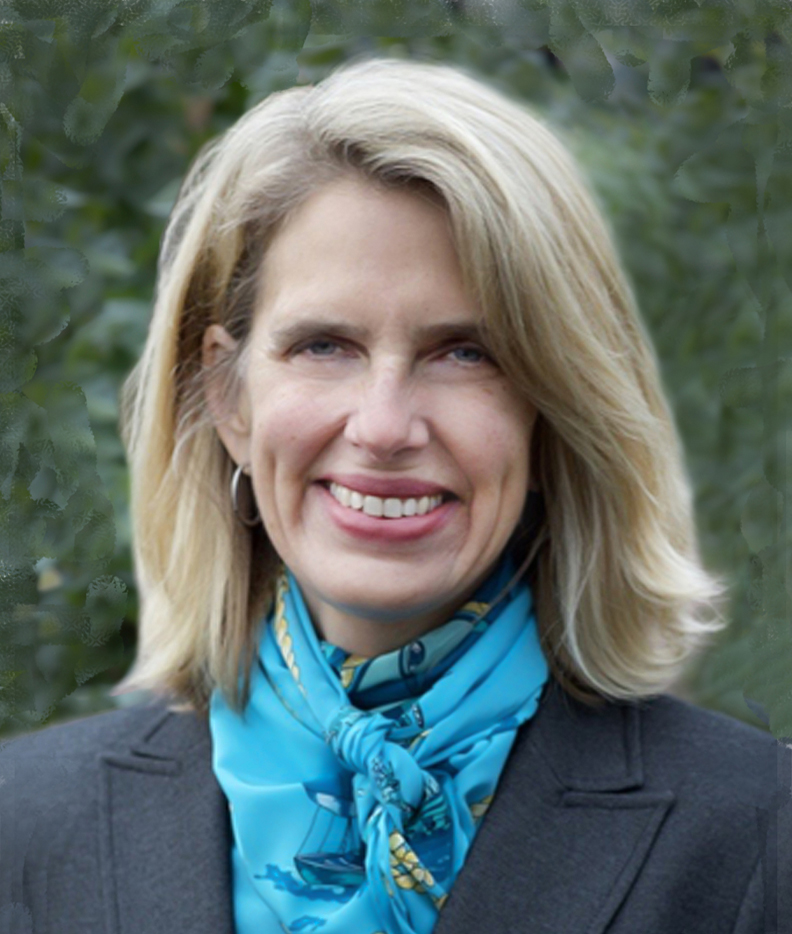
Why I’m involved with C-Change: The women who founded C-Change Conversations are an inspiration to me. They had the courage to start talking about the topic of climate change to conservative audiences when that was a really difficult thing to do. And our approach is working. As one of the team members who has presented the Primer, I’ve seen what a powerful tool it is to make audiences aware – and care – about the threat that climate change poses to their health, safety, and the economy.
What have you learned about climate change that makes you hopeful?
I am hopeful because many of the steps that we need to take to reduce greenhouse gas emissions will have tremendous “co-benefits” that will make our lives better in a myriad of ways. Our air will become cleaner as fossil fuels are phased out. The use of green infrastructure, like rain gardens, in our cities will help to address the flooding that will be the result of climate change-related increases in precipitation and storm intensity. Urban green spaces have been shown to reduce crime, improve mental health, and provide urban habitat for birds and insects. I also am hopeful because I see more and more people becoming engaged in their local communities, working together to solve the challenges of addressing climate change.
C-Change co-founder Pam Mount recently spoke at a climate change symposium sponsored by the City of Cape May, New Jersey and organized and moderated by Virginia Hesel, a Rutgers University Environmental Steward.
Dr. Ed Mahaney, a consultant on an array of development and sustainability measures and a former Cape May mayor, invited Pam to participate in the symposium titled, “A Scientific Approach to Global Warming and Climate Change.” In addition to co-founding C-Change, Pam is founder of Sustainable Jersey, owner of Terhune Orchards, and a well-known and respected leader in the sustainability, resilience, and climate adaptation movement.
At the symposium, held at the Cape May Convention Center in November, Pam joined a panel of environmental and health experts, including Dr. Thomas Herrington, associate director of the Urban Coast Institute at Monmouth University, and Dr. Rouzbah (Ross) Nazari, associate professor and co-director of Sustainable Smart Cities Research Center at the University of Alabama-Birmingham. While Drs. Herrington and Nazari focused on the science and impacts of climate change, especially to the New Jersey coastline, Pam spoke about how important it is for everyday folk to talk about climate change and what individuals and communities can do to curtail and alleviate the impact of greenhouse gas emissions. Check out our list of possible actions.
Sustainable Jersey’s programs are a critical piece of municipal leadership in addressing climate change, Pam acknowledged, but she emphasized that we can’t just rely on government programs to solve the issue. Individual choices matter – from how often we drive and what kind of car, to energy use at home, to the way we eat and what we do with food scraps after a meal, said Pam. “It’s like voting,” she said. “If each of us does it, if we all do our part, we can change the trajectory of the most important issue of our time.”
Congratulations, Pam! Thanks for all you do for C-Change and the planet!
In person and virtually, we’re heading down the road, across the state lines, and on to the Deep South over the next few months. Upcoming Primer presentation locations include:
Of note, next month Catherine Sidamon-Eristoff will present the Primer virtually to OLLI students at Duke University in Durham, North Carolina. OLLI (Osher Lifelong Learning Institute) is a continuing education program within universities in 125 locations in every state and Washington, DC. C-Change also has presented to OLLI programs at the University of California San Bernardino/Palm Desert and University of Utah in Salt Lake City.
We often hear, “How can I help?” Here are a few ideas for supporting our mission of educating more people about the changing climate and hopeful solutions.
Dear Friends,
Fall is always a transition time, sandwiched between the languid days of summer and the blurred race of the winter holidays. Our team at C-Change is already off to the races, and our days are blurring by. We’re back on the road doing live presentations, creating videos, showcasing new products, accessing new audiences, and winning new awards.
Why do we do this hard work? Because we know collectively we are all in a race – to come together to slow and manage climate change before it overwhelms us. The race starts right here in our home communities and across our broad and diverse country. And it starts by engaging others who do not understand the risk and inviting them to be part of the solution. Without broad public understanding of the scope and severity of the risk, we cannot have the public will to support action, and we cannot win this race.
Getting back on the road has been exhausting, but so validating. We are reaching discerning and skeptical audiences with tremendous success, from western Pennsylvania to North Carolina to Missouri and Minnesota. The unique way we frame the issue, and our inclusive tone and manner, are opening hearts and minds.
Thank you for your continued interest and support.
Best,
Kathleen Biggins
Founder & President
In early October, C-Change was honored to appear at Rally 2021, an annual land conservation conference hosted by the Land Trust Alliance (LTA). The organization is a national leader in policy, standards, education, and training for the land trust community.
Kathleen Biggins and Sophie Glovier presented “Storms and Floods: Talking to Conservatives about Water and Climate” to about 130 members of this influential audience. Land trustees are especially concerned about the byproducts of climate change such as flooding and subsequent polluted run-off and are uniquely positioned to initiate and sustain conversations about their concerns with members of their community.
The presentation focused on the health risks of climate change – especially our access to clean water − and how proven remediation efforts are making a difference. Jim Waltman, executive director of The Watershed Institute, a New Jersey organization of advocates, scientists, and educators helping keep water clean, safe, and healthy, introduced Kathleen and Sophie in the recorded presentation. Kathleen, the founder and president of C-Change, and Sophie, the Watershed’s assistant director of policy and a C-Change team member, answered questions from a live audience following the presentation. This was the second consecutive year C-Change has been invited to present at the LTA conference.
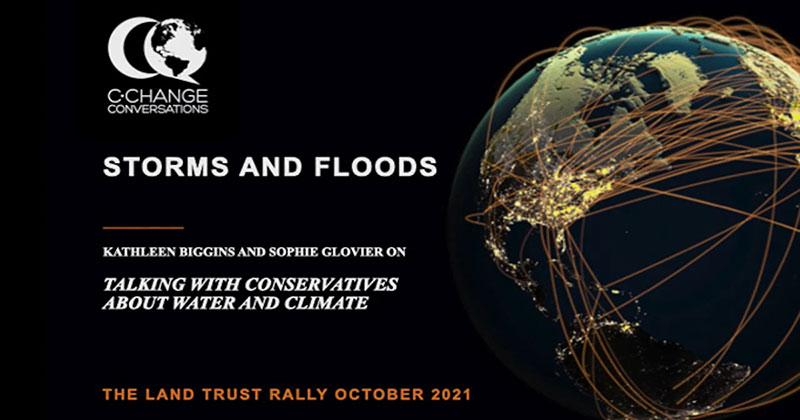
Also in early October, Kathleen Biggins joined other distinguished speakers and attendees from seven southeastern states at the Young Presidents’ Organization (YPO) Southern 7 Gold Chapter Conference in Linville, NC. YPO is a global network and leadership organization for young chief executives and business owners. Kathleen, founder and president of C-Change Conversations, delivered the Primer in person to about 100 YPO members. With at least several climate skeptics in the audience, it was gratifying that many people approached her after the presentation to say they understood the issue better and wanted to learn more.
The C-Change Conversations website, designed by Howard Design Group, was honored with a Silver award in this year’s w3 Awards, winning for “Best Visual Appeal” and “Best Experience.” Congratulations to Jo Singer and the talented team at Howard, and C-Change team members Pam Parsons and Carrie Dyckman, who led the project for us. And thank you!
The Health Primer is a new extension of our mission to deliver science-based, non-partisan climate change education. It focuses on how climate change will impact our ability to stay healthy and safe and what we can do about it. Covering the dire health effects of higher temperatures – including threats to our personal safety, food security, ability to manage diseases, air quality, and access to clean water − the Health Primer also explores how to innovate, mitigate, and adapt to a changing climate.
Like the original Primer, it is non-partisan, has powerful visuals, and is based on science from trusted sources. The Health Primer was well-received during several August and September presentations. Please contact Kathy Herring if you would like to learn more and explore booking the Health Primer for your group.
Did you know that air pollution is the second leading cause of lung cancers worldwide? And that air pollution and climate change are closely related? Turns out that not enough health care providers know this either. That’s why Drs. Christine Berg and Joan Schiller – both ardent supporters of the C-Change mission and contributors to our Health Primer – are reaching out to their peers in the medical community and others about how climate change and air pollution impact our health.
On September 7th, C-Change published Joan’s blog, “Two Sides of the Same Coin: Air Pollution and Climate Change.“ Joan also is a trained presenter of the C-Change Primer.
The same week, Christine virtually presented their joint air pollution/lung cancer research at the most well-attended session of the 2021 World Conference on Lung Cancer. The two oncologists found that five European countries − Serbia, Montenegro, North Macedonia, Bosnia/Herzegovina, and Poland − had the highest number of lung cancers due to air pollution among those aged 50 to 69. The correlation between burning coal and lung cancer in these countries is clear: Serbia derives 70% of its energy production from coal and Poland, 64%.
Thank you, Christine and Joan, for all you are doing to educate audiences about health risks tied to greenhouse gas emissions and a warming climate.
Throughout the summer and fall, our team is continuing to deliver the Primer primarily to conservative and moderate audiences, and, gratefully, in person. For example, Nancy Ylvisaker presented the Primer in St. Louis to nearly 80 engineers through the American Public Works Association. Right before Labor Day, Kathleen Biggins delivered the Primer to three audiences (Linville Book Club, Blowing Rock Country Club, and The Grandfather Mountain Club) in the North Carolina mountains. Response was so positive she received invitations from audience members to present in their home cities of Durham, Charlotte, Birmingham, AL, and Vero Beach, FL. Last week, she flew to Minnesota to present to about 90 guests of the Woodhill Country Club on Wednesday and delivered the Primer presentation again the next day to the Minnetonka Garden Club.
Dallas Hetherington presented to members of the Four Seasons 55+ community in Warren, NJ and to about 70 people at the Rolling Rock Club, near Pittsburgh, PA. Dallas shared some of the feedback he received after the latter presentation from Simin Yazdgerdi Curtis, president & CEO of Pittsburgh’s American Middle East Institute. Simin said, “I have never heard (nor seen) such a comprehensive, visually powerful talk about Climate Change as I witnessed from you last night. The extent of the warming of our planet − with such shocking animated graphics − could not have been better conveyed than by your calm, articulate, ‘just the facts, ma’am’ delivery. In short, you are a great communicator and are engaged in an important mission.”
This receptivity mirrors our experience before COVID shut down in-person presentations, and it is reaffirming to see that our audiences value our content and approach.
Our first large benefit, “Wine in the Time of Climate Change,” was a wonderful success. Sipping wine on a beautiful September evening, about 70 new and long-time friends and supporters enjoyed wine and spirits entrepreneur Mark Censits’ informative presentation about how winemakers are adapting to a changing climate and where we can find good wines in the future.
We are incredibly grateful to our sponsors − CoolVines, Otherwise Engaged Events, Skurnik Wines and Spirits, Terhune Orchards, and The Watershed Institute; our partner, Almora Advisors; and the amazing, hard-working C-Change volunteers.
Speaking of which, C-Change Conversations is a non-profit organization, run entirely by volunteers. We hope you will consider supporting us, especially on Giving Tuesday (November 30th) and through our year-end appeal. Please watch your email for these special opportunities to help us reach more people with non-partisan, science-based facts and a hopeful message about climate change.
Sometimes you meet someone who is so interesting and articulate that time accelerates when you are with them. You look up and hours have passed when it felt like only minutes. Margaret Koval is one of those people. An Emmy-winning journalist with a broad range of interests and knowledge, and an accomplished artist who has lived abroad and travels widely, she always brings a fresh and insightful perspective.
We met when Margaret interviewed me for the “She Roars” podcast at Princeton University in which she showcased the school’s female graduates and professors who are making a difference in the world. We have several team members who are Princeton alumnae, and we were honored to have our C-Change story be included. When we decided to create a monthly newsletter curating climate news for our C-Change family, I immediately asked Margaret to come on board to help us write it, and to our collective delight, she agreed. Every month we wrestle with selecting news of hope and news of concern, including insightful quotes and engaging videos, and then Margaret adds her magic and weaves the story together. Take a look.
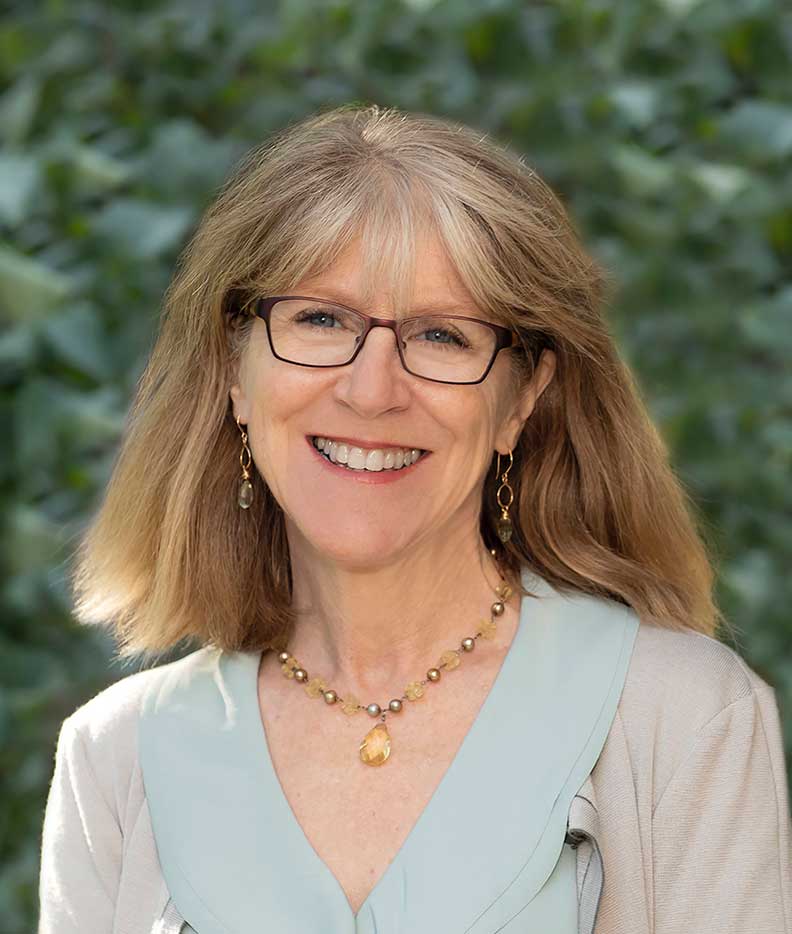
Why I’m involved with C-Change: I joined C-Change because it fills an incredibly important gap in the firehose of communications around the issue of climate change. It focuses on people who are unsure what stance to take and recognizes that most are busy, skeptical thinkers who welcome non-partisan information that is digestible without a PhD in atmospheric science. C-Change also appreciates the importance of economics, business, and jobs – not as part of the problem but as central to any real solution to global warming.
What have you learned about climate change that makes you hopeful? In the last few years, I’ve been deeply encouraged to meet many of the researchers and businesspeople working furiously on the issue of climate change. The biggest blast of hope for me came from a Princeton University study that mapped out five different ‘pathways’ to transform the U.S. energy sector – any one of them could achieve net zero greenhouse gases and go a long way to stop global warming. All of them would result in MORE jobs, more economic opportunity, and better human health compared to doing nothing.
TapintoPrinceton, an online community news source, provided wonderful exposure for C-Change in “If you think the weather’s wacky, a neighbor can probably explain.” We are so grateful to Richard Rein and Princeton, NJ-area journalists for sharing our story and encouraging more people to support our mission.
Do you know of other news outlets that would be interested in our story of a band of volunteers who offer non-partisan climate education and are opening minds and building consensus about climate change − one individual, one community, one conversation at a time? If so, please contact Kathleen Biggins with ideas for reaching more people with our message through print, broadcast, and online news sources. Thank you!
Dear Friends,
Happy Summer! Despite growing up in the Deep South where the weather can be scorching, summer is my favorite season. The long days and the hot stillness make it a time for reflection, reading, and just sitting still and being. The hectic pace and chaos of the “school year” slows.
But that quiet is fleeting. At C-Change, we are back on the road and I’m busy developing new Primers. Two of our presenters, Nancy Ylvisaker and Dallas Hetherington, have given in-person Primer presentations this summer, and I will in August – for the first time since February 2020 – with talks near the beaches of Long Island, New York and in the mountains of North Carolina. While at C-Change it feels like we are getting back to “normal”, Mother Nature is doing anything but. Record-breaking heat, devastating floods, wildfires, drought, and other extreme weather events made worse by climate change continue to cause loss of life, jobs, and property. As one friend complained to me recently, “It seems like climate change is everywhere and on the news every night.” Indeed.
But there’s good news on the climate front, too. The Washington Post’s interview with Rep. John Curtis (R-UT) [paywall] gives me hope. The founder of the Conservative Climate Caucus, which now has more than 60 Republican Members of Congress, holds many views that are aligned with ours: climate change is real and must be addressed; we can protect and even grow jobs as we reduce greenhouse gas emissions; we must do more as responsible stewards of the planet, protecting it for future generations; we must invest in the innovative technologies that show so much promise; and more.
Why are we seeing this shift? In large part because younger voters are demanding it and the climate-fueled damage around us is so visible. The politics surrounding the issue is changing, and that is an important first step toward coming together to create meaningful and long-term solutions.
I hope you enjoy more good news below. As always, we welcome your feedback and questions.
Warmly,
Kathleen Biggins
Founder & President
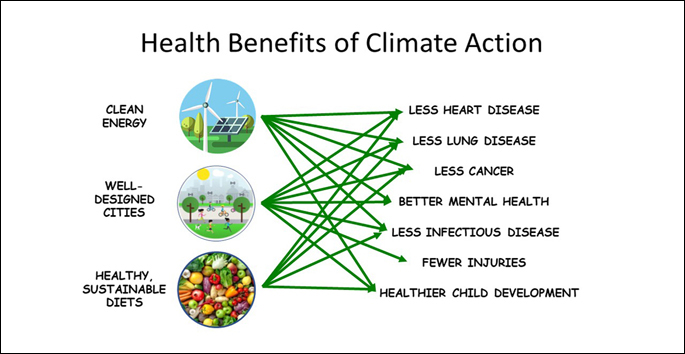
C-Change is launching a new presentation in September! We are eager to share it with new audiences and with those who’ve seen our original Primer. The “Health Primer” covers the basic science of climate change and how it is compromising the essentials of good health: physical safety and shelter, secure food sources, clean water, clean air, and our ability to manage diseases. We’ve scheduled two Health Primer presentations in September – for the Garden Club of Princeton and for Princeton Windrows, an independent living community.
In case you are wondering, the image above (discussed in our Health Primer) is not rhetorical or decorative. Behind every green arrow there’s a body of solid evidence that supports the link between climate action and improved health. If you would like to schedule an in-person or virtual presentation of the Health Primer or our original Primer, please let us know.
C-Change is thrilled that Mark Censits, noted wine and spirits entrepreneur, will be the featured speaker for our fall fundraiser. He is the founder and president of CoolVines, a New Jersey-based company that specializes in artisanal, hand-crafted, and responsibly and sustainably produced wines from around the world.
Extreme heat, drought, and wildfires – which not only can burn crops, facilities, and equipment but also taint grapes with smoke that has wafted from far away – are challenging even the most seasoned of winemakers. As new wine areas are opening up and old areas are losing their ability to grow the best grapes, it is a time of disruption and innovation, providing opportunities for the savvy connoisseur. Mark will share some of his favorite new wines and walk us through how climate change is impacting the wine industry.
The event will be held on September 19, 2021 from 5-7pm at The Watershed Institute in Pennington, NJ. For more information and if you would like to receive an invitation, contact us here.
From Kathleen Biggins – I am pleased to introduce two more important team members who contribute so much to our work: Margaret Sieck and Tina Alt.
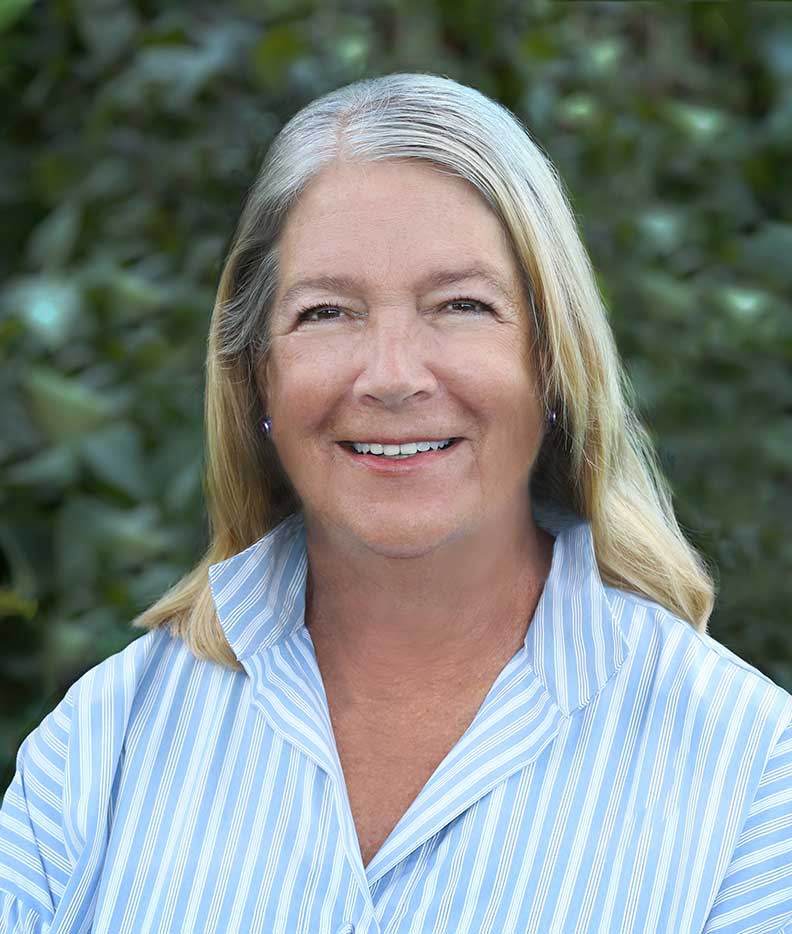
Margaret Sieck was there before the beginning. We were driving back from a conference in Washington, DC together, discussing what we heard from a general and a business person warning that climate change posed significant risks for our geopolitical security and our economy. We were surprised because they definitely did not seem like green-leaning liberals, and yet they had laid out such dire outcomes. And we were concerned because we knew most of our friends and families had a different perspective – that climate change wasn’t real or if it was it would only impact far-off generations in far-off places – and we recognized it would be very hard, if not impossible, to change their minds. It felt so overwhelming, and for long stretches we drove back in silence, feeling defeated.
Fast forward to today and Margaret is a critical player in successfully changing those hard-to-influence hearts and minds. The skills she honed by working at national magazines make her a formidable and seasoned editor (I fondly call her the dragon lady!), and she is a very important part of our communications team. She edits our blogs, newsletters, and op-eds, lending a critical eye to the language we use and finding some of the images we choose to educate our C-Change “family.”
Margaret helps create and protect C-Change Conversation’s unique voice. We couldn’t do it without her!
Why I’m involved with C-Change:
What have you learned about climate change that makes you hopeful?
I am hopeful that more and more people are turning to science and facts to help defend against what is a clear and present danger. I want my grandchildren (soon to number three!) to know that I worked to make a difference and deliver unto them a planet that is not burning up or awash in floods because people cared and acted.
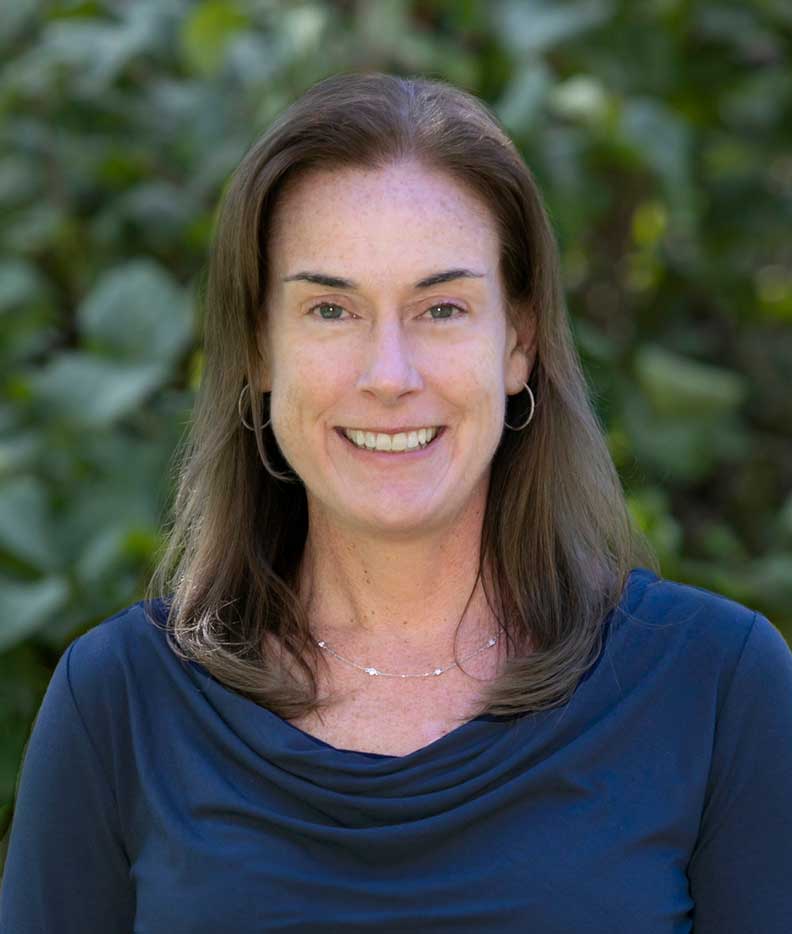
Tina Alt is one of our jack-of-all-trades “can do” volunteers – moving seamlessly from supporting our Primer Presenter training program to helping run our development efforts. One of my favorite stories about her: we were in Tiverton, Rhode Island, and Tina was lying on the floor of the public library taking apart a recalcitrant and complicated technology system to make it accept my computer’s input so we could start the presentation. We had a restive and packed crowd and the library’s staff had been working on the problem for an hour. Tina was unflappable, and she saved the day.
Tina is like that – she is dauntless, organized, rolls up her sleeves and gets things done, and is great under pressure. She brings a fresh point of view and creative solutions. As a Physician’s Assistant, she has keenly focused on the science underpinning climate change and on how it will impact our personal health and health systems.
Tina approached us after hearing our Primer presentation at the Lawrenceville School, where her children were students. We are so glad she did!
Why I’m involved with C-Change:
Through the Primer and our other educational programs, C-Change Conversations explains climate change in a clear way that follows logic and the science and makes it easy to understand why it is urgent to change our individual behaviors and call for change in government and corporate policies. I especially like how we emphasize that climate change is impacting our national security, jobs, and the economy and that this is an issue that transcends politics.
What have you learned about climate change that makes you hopeful?
There are many possible ways to reduce carbon in the atmosphere, even though current technologies are expensive and not yet 100% successful. It reminds me a little bit of cancer – when curing cancer used to be a dream and now for many kinds of cancer, it is a reality. I also am hopeful because I know there is also a lot we can do in our own lives that are small adjustments that will significantly reduce our carbon footprint.
Our climate change Primer has been in demand this spring and summer, both virtually and in person. Pictured here is Dallas Hetherington, presenting in July at an event in New Jersey hosted by the Mantoloking Environmental Commission and the Mantoloking Yacht Club.
After his talk, an audience member wrote, “Loved it! Climate change is quite a multifaceted topic, and I found the presentation to be very digestible. I especially appreciate the highlight of business contribution to the climate crisis, in that it’s important to remind folks that voting matters (individuals can only have so much power in holding businesses accountable, and we need to do so through policy/legislation).” In June, Dallas also presented the Primer (virtually) to his Chi Phi, Rho fraternity brothers.
Other recent events include Catherine Sidamon-Eristoff and Nancy Ylivsaker presenting the Primer virtually to the Lenox (MA) Garden Club, Kathleen Biggins and Joan Schiller presenting (also virtually) to The Study Group in St. Louis, and Nancy presenting in person to the St. Louis Women’s Club.
In 2021, we’ve presented the Primer 27 times to nearly 1,200 people! Would you like to schedule a talk for your employees, associations, and community groups? The Primer provides audience members with the scientific facts and language to talk about the issue with others. We welcome the opportunity to present to anyone interested in a fair and balanced approach to climate change, including people who do not think climate change is a significant threat, along with those who are already concerned.
Our current August-October Primer schedule includes in-person presentations to:
Dear Friends,
Happy Spring! Just like the daffodils and tulips that are popping up here in Princeton, there’s lots of new activity among our growing team of volunteers. From presenting the Primer to our first international business audience, to our new website, to a great event with one of our climate science advisors, our momentum is on the upswing.
There is still great concern as the science becomes clearer and because so many people are underestimating the risk of climate change and clinging to the status quo. But there are more reasons for hope than in a long time, as new technologies offer answers.
We are hopeful and energized by positive news and developments in addressing the climate crisis. We hope you are too! Staying informed and engaged is an important way to be part of the solution.
Warmly,
Kathleen Biggins
Founder & President
In 2021, our growing team of trained presenters has already delivered our Primer presentation (via Zoom) 18 times to nearly 1,000 people. Here we spotlight two of this year’s Primer events.
C-Change has gone global! In early March we presented our “Climate Change Primer for Business” to our first international audience. Employees of Commonwealth Bank of Australia tuned in from Australia, New Zealand, Hong Kong, Singapore, London, Amsterdam, and New York. Here’s what Bill Woodley, the bank’s head of U.S., U.K., and Europe, had to say about the event:
“Kathleen Biggins presented the C-Change Conversations Primer to great acclaim to about 200 bankers and business people located across the globe. The Primer is logically prepared and delivered, giving the audience both the foundational science behind climate change and relating it to issues that matter to everyone. Throughout the presentation, Kathleen weaves in themes such as Jobs and Economy, Health and Personal Security, and Geopolitical Stability, demonstrating how climate change impacts them all. The Primer is pitched as a ‘non-partisan conversation’ on the topic of climate change – designed to push past political preconceptions and attitudes – and it delivers on this promise most effectively. Kathleen’s style is passionate, not preachy, and leads the audience to the conclusion that action is imperative and overdue. Some of the examples of technology-led initiatives are fascinating and show how sustainable business can have positive impacts on our local economies and communities. I would recommend the C-Change Primer as a great investment of time for people of all backgrounds and experience, but particularly to companies that want to ensure their employees understand and can speak comfortably about climate change.”
Our home state of New Jersey is instituting climate change education for grades K-12 and across disciplines, not just in the area of science. In February, C-Change was pleased to be a featured presenter for Sustainable Jersey’s Climate Summit, where students and teachers participated in virtual sessions to learn about actionable ways to address the climate crisis. Our “Climate Science Primer for Educators” helped the audience of teachers feel more comfortable and confident in their ability to bring high quality and accurate climate change information to their students. Since the Summit, C-Change has met with school leaders and administrators to discuss ways C-Change could support the state’s climate change education initiative and has been invited to present the Primer at another teachers conference in May.
From Kathleen Biggins –
“I’m on it.” Those are the most frequent words I hear from Catherine Sidamon-Eristoff, our Treasurer, overseer of Development, and Primer presenter. Her “can do” attitude and impressive skill sets – she’s a talented writer and presenter and is world-class in pulling people together and forging connections – make Catherine a critically important and respected member of our team.
Catherine is on our Executive Committee and helps to drive strategy and develop policy. She is also willing to “roll up her sleeves” and get a tedious, brain-numbing job like overseeing charitable registrations in 50 states not only done, but done well. She exudes competence and professionalism, is unflappable (despite being tested on multiple occasions), and is truly artful in her ability to run meetings. In short, she is one of those people who has and gives it all – a leader and a team player with both great heart and intellect.
We are so grateful for her many contributions. Learn more about Catherine below.
From Catherine Sidamon-Eristoff –
Why I’m involved with C-Change: I joined C-Change because I believe that climate change is the overriding issue of our time, and we need to heighten awareness of the scientific facts and implications for ourselves, our global economy, and our planet. While I have been involved in environmental education my entire adult life, the C-Change Primer and our other education programs provide exactly the kind of information more people need so they can better understand the challenges and opportunities ahead.
What have you learned about climate change that makes you hopeful? I am hopeful because the dialogue around the issues has shifted from “Is it real?” to “What are we doing about it?” More and more, businesses, governments, and citizens are acknowledging the risks of climate change and how it affects them. There are myriad creative ways to address these risks, with as many coming from nature and individual action as from technological advances. I am also hopeful because I have seen firsthand that once people understand the science, they are willing to act to affect sustainable change.
Wednesday, May 19th, from 4:00 – 5:30pm
Please join us for flower arranging and conversation (under a tent) to benefit C-Change Conversations.
Stay tuned for more in-person and virtual events!
Let us know if you’d like an invitation.
According to many climate scientists, the biggest impediment to preventing further climate change is the lack of public will to address it. Hope is crucial for inspiring action and is central to our approach to building consensus around addressing climate change.
And so, in early February we were excited to host “Reasons for Hope,” a conversation with one of C-Change Conversations’ climate advisors, Bernadette Woods Placky. Bernadette is an Emmy Award winning meteorologist and director of Climate Central’s Climate Matters program. She has attended international conferences on climate change and is often featured on national and local broadcasts explaining how climate change is exacerbating many extreme weather events.
C-Change Conversations was deeply grateful to receive a generous donation along with heartfelt thanks from the Garden Club of America (GCA) for our leadership in climate change education, especially during its 2021 National Affairs and Legislation Conference (NAL) and for the past five years. As noted in our January newsletter, C-Change team members Kathleen Biggins helped to kick off the 2021 conference by moderating a panel of the keynote speakers; Sophie Glovier led a session on how individuals can help their community take action; and Katy Kinsolving educated audience members about the nexus of agriculture and climate change and making wise food choices to protect our planet.
C-Change has presented our Climate Change Primer to 14,000 people in 31 states and overseas, thanks in large part to the support of GCA and its members. About half of GCA’s 200 member garden clubs have hosted Primer presentations in their communities or via Zoom, with new invitations arriving each week. While our organization has grown from four GCA club members to 30 volunteers across the country, and we now present to a wide range of audiences, we will never forget that our work was inspired by an NAL presentation and that garden clubs took a chance on hosting our Primer presentation when we were just starting out. We are so thankful for GCA’s continuing support.
This month C-Change launched a beautiful new website that reflects our vision, mission, and the scope of our work to improve understanding about the science and effects of climate change and facilitate ongoing discussion and engagement on the issue.
Many thanks to Jo Singer and her team at Howard Design Group and to C-Change team members Pam Parsons and Carrie Dyckman for their patience, creativity, and phenomenal effort behind this important tool for introducing C-Change Conversations to the world. We hope you will check out the new website and visit it often for new resources that will help you learn more and feel comfortable talking about climate change.
With the New Year comes exciting news from C-Change Conversations. This month we celebrate the milestone of delivering our Climate Change Primer presentation to more than 10,000 people in 30 states. In 2020 alone, we gave the presentation 32 times! We aim to double this record-setting number in 2021.
Welcome to the fall edition of our quarterly newsletter. As you will see below, we are committed to reaching new audiences – even during the pandemic – and extending our impact far and wide.
In the Northeast, the leaves are beginning to turn, splashes of vibrant colors erupt across the tree-scape, and we are reminded of the ever-constant flow of seasons, the consistent and comforting rhythms of nature. Yet, at the same time, we are experiencing nature in ways that are no longer consistent or comforting – whether it’s the hottest temperature ever recorded earlier this year, running out of traditional names for tropical storms because we’ve had so many, or the behemoth “gigafire” (an unprecedented 4 million acres) burning in California. These events underscore that our world is evolving, made more dangerous by climate change.
There is just so much vying for our attention – the pandemic, the election, racial injustice, to name just a few – and it’s easy to get overwhelmed. But we’ve got to keep our eye on the biggest threat of all – the one that has so clearly crossed from the future into the present – that nature is now playing by new and dangerous rules. Our economy and civilization are built on the premise that nature acts a certain way. There is a good chance that this premise will no longer hold true if we continue on our current emissions path. We are changing the chemical composition of our atmosphere, which, in turn, is changing our natural systems at a breathtaking rate.
So, what can we do?
Scientists say we need to pull together, to forge social consensus for action, to face this threat successfully and overcome it. But we can only pull together if enough people care. People will only care if they understand the scope and scale of the risk and how it will impact them personally. C-Change Conversations provides that understanding – in a clear, science-based, non-partisan, non-threatening way. And we bring that message across the country, including to conservative groups and to conservative places where this message isn’t often heard. We are successfully opening minds and hearts and pulling people together so we can meet this threat.
We are working hard to provide valuable information to empower you, our C-Change family, to influence others and help build the consensus, too. Thank you for being on this journey with us.
Best,
Kathleen Biggins
Founder and President
Land Trust Alliance National Conference Features C-Change Speakers
C-Change returned to a national stage on October 6th with Kathleen Biggins and C-Change co-founder Katy Kinsolving speaking during “Rally 2020,” the annual conference of the Land Trust Alliance. More than 3,600 land conservation trustees and practitioners virtually attended the 3-day conference that examined issues critical to the future of land conservation. Kathleen and Katy presented “How to Talk to Moderates and Conservatives about Climate Change” to an audience of 500. Their talk featured excerpts of the C-Change Primer presentation and examined how land preservation and use, and agricultural practices, can mitigate climate change. After the taped presentation, Kathleen and Katy fielded questions from the audience. You can watch the presentation here.
In her introduction to the presentation, Lisa Ott, President of the North Shore Land Alliance in Oyster Bay, New York and a member of the Garden Club of America, notes that C-Change Conversations team members were “just the right people to bring this message” about climate change to her colleagues and that they presented the risks and opportunities of climate change “factually … in a science-based way … and they were not threatening to the people of our community.”
New Primer Presenters Extend Our Reach
A handful of C-Change volunteers have presented the Primer to about 10,000 people in 29 states since 2018. The demand for non-partisan, science-based information about climate change spurred us to expand our ranks, and over time, we developed a robust presenter-training program that will enable us to reach even more people.
Ask a Scientist
Here are some questions we recently asked our science advisors. Be sure to check out more Q&A on our website and submit your questions here.
Bernadette Woods Placky, Climate Central’s Chief Meteorologist and Climate Matters Program Director
How is climate change impacting hurricanes now and what’s expected in the future?
Hurricanes get their strength from warm water, and those waters are getting warmer.
Scientific research shows that more of the hurricanes forming these days are rising to the level of a major hurricane – category 3-5 on the Saffir-Simpson scale. And more storms are rapidly intensifying – when storms go through an explosive growth period of 35 mph in 24 hours. This is particularly dangerous when it happens close to landfall, limiting time for proper preparations. When storms do make landfall, they are more damaging due to more heavy rain and higher storm surges that push farther inland.
Nadir Jeevanjee, Princeton University
What argument is used by the 3% of scientists who don’t agree that climate change is happening/human-caused?
My impression is that this “3%” generally consists of scientists who acknowledge that CO2 is rising due to human activities, and who also acknowledge that this rising CO2 will cause some global warming, but who disagree on the amount of warming it will cause. These scientists might be suspicious of estimates from computer climate models due to their complexity, and may have other explanations for some of the warming we’ve observed so far, such as natural fluctuations. Such skepticism and formulation of alternative hypotheses is natural, and is moreover an essential part of a healthy scientific enterprise. But the accumulated evidence, as documented in ever-expanding reports by the IPCC and other bodies, continues to point to human-emitted CO2 as the main driver of observed climate changes.
Liz Sikes, Rutgers University
What factors triggered the end of the last ice age?
We believe that the fundamental trigger for the end of the last ice age was increasing insolation (more heating from the sun) over the northern hemisphere, where the main glacial ice cap sat. Increasing insolation happens as the earth’s orbit changes shape naturally – sometimes a component of this is referred to as the “wobble of the poles.” These changes have timescales of about 20,000 and 40,000 years and have a slow-paced influence on climate. These shifts in solar radiation can initiate carbon feedback loops, which causes more rapid changes within the climate system. Scientific evidence shows that as the increased solar radiation warmed the oceans, circulation patterns changed and CO2 that had been sequestered in the deep ocean was released into the atmosphere. These increased CO2 levels heated the atmosphere up further and were an important driver in the last deglaciation, the ice loss that ended the last ice age. We are seeing the same thing happening today. As we raise CO2 levels through our greenhouse gas emissions, we are seeing increased deglaciation in our polar regions.
“I have had such good fortune in experiencing the profound beauty of our world, and learning how critically reliant we are on the health of our planet. I want to address these issues for the sake of my children and all future generations – and for the sake of our imperiled earth.”
Nancy’s career has spanned investment banking, community development, and non-profit management. She spent 15 years with JP Morgan and Merrill Lynch in New York as an investment banker and then as head of their Community Development Corporations. After moving to St. Louis, she headed Bellefontaine, a non-profit historic cemetery and arboretum. Nancy is the board chair for the Nature Conservancy in Missouri and serves on the board of the Harris World Ecology Center, the Conservation Mission Council of the Missouri Botanical Garden, the Finance Committee of the Garden Club of America. Nancy also is starting a C-Change team in St. Louis. She recently completed a post-graduate program at Yale in Financing and Deploying Clean Energy.
We live in interesting times (an understatement!). Our sense of security has been shattered by the COVID-19 crisis and our sense of identity challenged by George Floyd’s killing and the ensuing reflection of who we are as a nation and as individuals. We are emotionally spent.
And yet, exhausted as we are, we need to keep in mind another challenge, climate change. Its threat may feel less immediate, but its consequences are much longer term. Scientists warn we need to act now, or our current emissions path will create a dangerous and dystopian world – one with devastating heat waves, food deprivation, more droughts and floods, and more exposure to disease. Because of our inaction so far, we are on track to leave our children and grandchildren a world we would never accept for ourselves.
Before COVID-19 emerged, the momentum on climate change had shifted. Republican leaders, recognizing that younger Republicans and independents care deeply about the issue, were finally talking about solutions like planting trees, investing in carbon capture and new nuclear power technologies. Democrats were fleshing out different approaches to a “Green New Deal.”
Today much of that momentum has been lost as the world wrestles with the COVID-19 crisis. Some countries are using their stimulus packages to pivot to the future – building green infrastructure and jobs. Others are simply trying to restore the status quo. We are at a critical inflection point, and how we, as individuals, nations, and a global society, choose to act will have important ramifications for our future.
And C-Change is still at work and has helped nearly 10,000 people understand the risks of climate change with our award-winning Primer. We are energized to reach an even larger audience when we look back on the great reception and positive news coverage we received for Primer presentations in Shreveport, LA and to the World Affairs Council in Hilton Head, SC.
During the COVID lockdown we continue to educate others remotely with our Primer video (followed by a live Q&A session) and webcasts. We are also working to expand our website and to deliver more climate information and analysis to our supporters. Please let us know if you want to help by inviting us to send our video or present virtually to clubs, schools, or associations in your community. Be well and stay safe.
Warmly,
Kathleen Biggins, Founder and President
Why Businesses Need to Lead on Climate Change
Pre-COVID, Kathleen interviewed Andrew Winston — a noted author and advisor to multinational companies — in the Princeton Public TV station. They had a fascinating discussion about why it is in businesses’ best interest to aggressively move to reduce climate risks — for their own bottom line and for the rest of society. Watch the interview here.
Tips for Taking Action
C-Change in the News
Upcoming Events
C-Change is rescheduling in-person events with webcasts where possible. Let us know if you’d like to arrange a Primer presentation with your business group, club, church, or school.
Tentative upcoming events include presentations to the Southampton, NY Garden Club, Jackson Hole, WY Thursday Roundtable, and the Young Presidents Organization. The Land Trust Alliance has confirmed our spot on the schedule for its October annual conference, Rally 2020.
Back in February, C-Change Conversations presented the Primer to our largest audience ever (600 people!) in Shreveport, LA. Then we headed to public and private events in South Carolina, speaking to curious, concerned, everyday citizens and business and community leaders alike, all grappling with the issue of climate change.
Today is a very different story as we practice social distancing, quarantining, and adjusting to the realities of a pandemic. We are concerned with the safety of everyone, especially our many friends and supporters around the country. Our thoughts are with you as we collectively negotiate these difficult times.
And, as preoccupied as we are with COVID-19, we can’t take our eye off the slower yet no less menacing threat of climate change. Now more than ever we need trusted, scientific sources to better understand our world and
how to keep it and all of us safe.
To that end, we bring good news. C-Change Conversations is pleased to present new virtual learning resources for fans of our science-based, non-partisan approach to climate change: two virtual presentations of the award-winning C-Change Conversations Primer and “Ask a Scientist.”
While we can’t be together, we can band together to share good information and good thoughts. Please stay in touch and stay safe.
Warmly,
The C-Change Conversations Team
Virtual Presentations of the C-Change Conversations Primer
In celebration of Earth Day, C-Change presented the Primer as a webcast for the first time, in partnership with the New Jersey Conservation Foundation and Princeton Public Library. You can watch and share a recording of the webcast here. If you would like to schedule an interactive, virtual Primer presentation like this for your group, please let us know. Or, consider watching this recording of our Primer presentation, which we produced in the Princeton Community Television studios.
Ask a Scientist
At a time when there are many unanswerable questions, we are happy to have enlisted three trusted scientists to provide answers to common climate questions (see below). We encourage you to submit your own questions here and visit the C-Change website often to read new questions and answers from the scientists.



